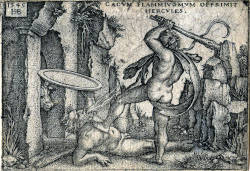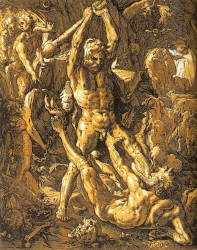The Eifel Giant Kakus
The Eifel Giant Kakus, the Hero Hermules and the Beautiful Fey


Between the Venn and the Rhine near the village of Eiserfey in the Schleiden district, enormous rock masses tower above the adjacent valley of the Feybach. Inside a mountain of pure rock, the cliff contains two cave halls with a huge vault of stone. In ancient times, the giant Kakus, who was feared far and wide, lived in the largest cave. All who passed through the valley had to pay tribute to the giant. In the second cave lived a bearded hunter with his lovely little daughter Fey.
Once, when a shepherd boy was driving two lambs through the valley, the giant Kakus wanted to take the lambs from him too, and all the shepherd boy’s pleas were in vain. Then Fey came and begged the giant to give the lambs back. Kakus relented and promised not to take away anyone’s possessions in the future.
At that time, the old goddess Jola lived in the East and gave birth to a son whom she named Hermules and who soon grew into a strong giant. He was soon praised as the strongest hero, who remained victorious in all battles and whose aspirations were increasingly directed towards adventures in the great world. He was also in favour with all women, but nowhere did he find the right one, although he travelled the whole world in search of the most beautiful one he liked. When he returned from his long wanderings, he asked his mother Jola to ask the stars where the most beautiful woman on earth was. Jola found the interpretation in the mirror of the stars the next midnight and said: "Over there in the Germanic country, where the father Rhine flows, one always found the most beautiful virgins". Hermules then girded up his sword and went to the Rhine.
When Hermules had reached Lake Constance, he asked Father Rhine where the most beautiful of the maidens lived. Father Rhine told him of the beautiful Loreley on the Rhine, but even more beautiful than her was the dear Fey in the Eifel forest. But all courting would be in vain, as her father would not give her up and the giant Kakus would oppose her abduction with all means. Hermules’ desire only grew stronger, and he threatened to slay the giant Kakus if he resisted.
Frightened by this threat, Father Rhine regretted his words and quickly sent a mermaid down the Rhine to warn those threatened. Down on the banks of the Rhine, the mermaid met a shepherd to whom she told of the impending danger and asked him to hurry to the rock cave and warn Fey and Kakus. The shepherd, who was the same one to whom Fey had given the two little lambs, was happy to be able to show his gratitude and quickly brought the news to Kakus’ cave.
Kakus knew no fear, and he prepared to receive Hermules. Armed with spear and club, Kakus watched from dawn to dusk on the rocky plateau for the strange giant. Finally he came along and as soon as the two giants caught sight of each other they clashed. For hours the fight went back and forth with club and sword. Its rage penetrated deep into the cave where Fey had fled in anxious anticipation and worry.
In desperation, she finally rushed out of the cave and threw herself between the two fighters. At that moment Hermules drew his sword anew and the deadly steel struck Kakus and Fey simultaneously, both collapsing in death. Hermules, covered with heavy wounds, left the place of blood to return to his homeland. But after a while on his way back in the direction of the Rhine he died of severe haemorrhaging on what is now the Hermesstein. Today, he is still remembered by the field name "Hermesberg" in the village of Weyer, in whose district the Kakus cave is located; in nearby Harzheim, the field name "Hermesberg" is also found, and in Weiler, the "Hermesstein".
Where Kakus and Fey sank into the grave, the clear Feybach has its source, whose waters roll to the Rhine. The name of Fey has always been honoured, and a hearty and lovely girl used to be called Fei after her. But the most beautiful of the beautiful was called Fairy, and it is said that where the Fey lived was the home of the fairies.
- On showcaves.com
 Kakushöhle
Kakushöhle
 Search DuckDuckGo for "The Eifel Giant Kakus"
Search DuckDuckGo for "The Eifel Giant Kakus" Der Eifelriese Kakus (visited: 03-APR-2021)
Der Eifelriese Kakus (visited: 03-APR-2021)
 Index
Index Topics
Topics Hierarchical
Hierarchical Countries
Countries Maps
Maps